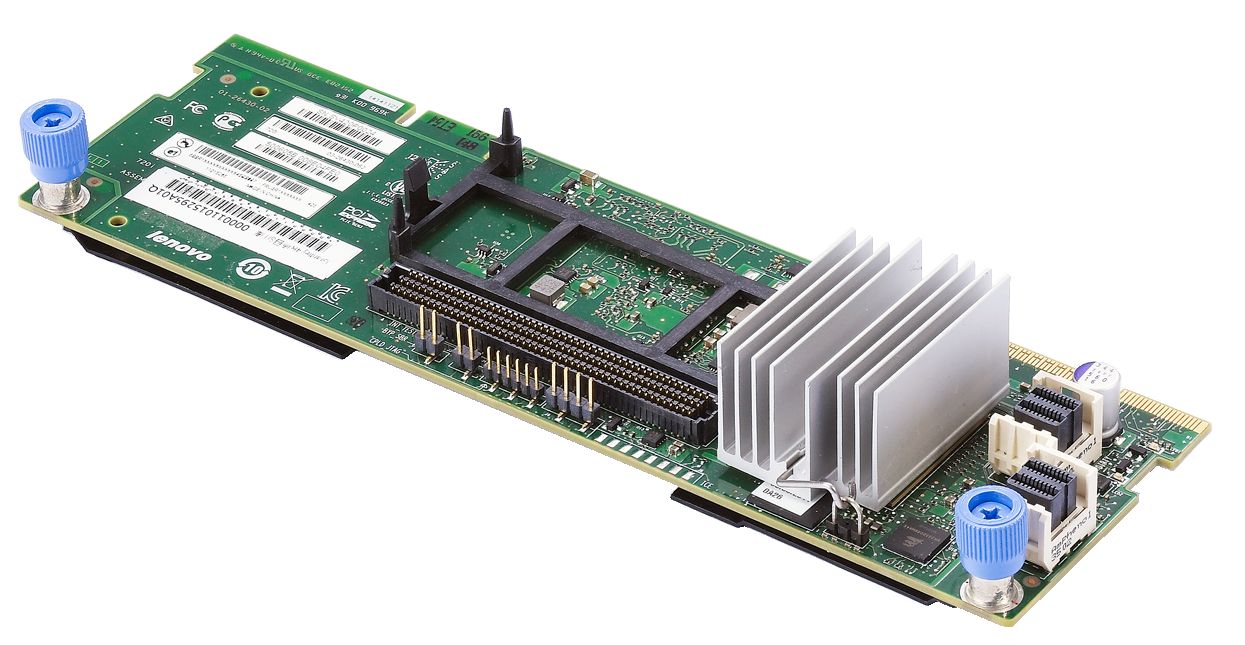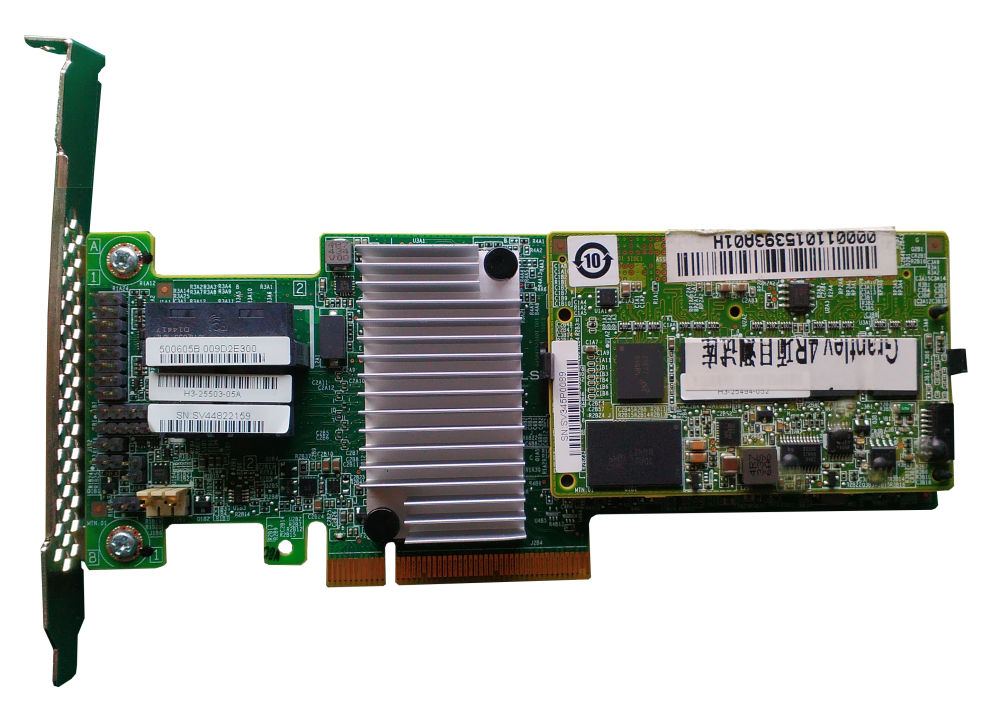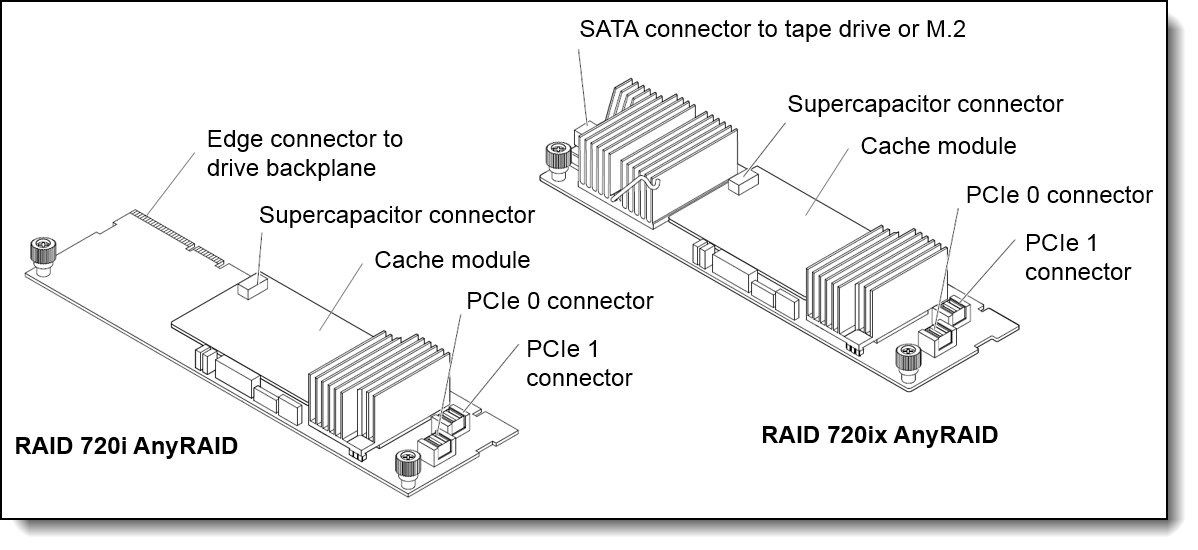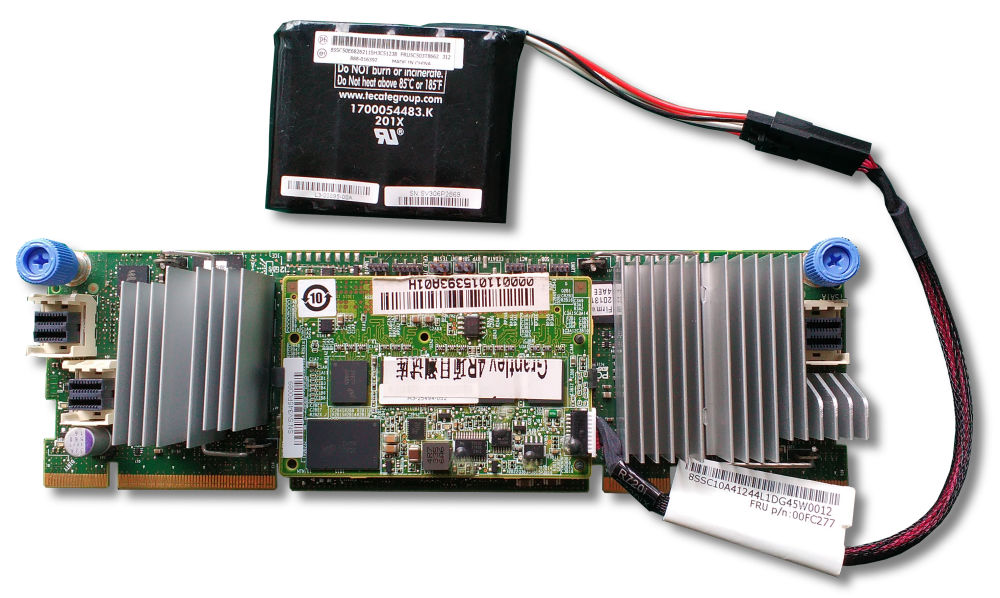Abstract
The ThinkServer RAID 720i family of 12 Gbps SAS RAID controllers are high-performance RAID-on-chip adapters that offer maximum performance, caching options and advanced tiering and performance software.
This product guide provides essential presales information to understand the RAID 720i adapters and their key features, specifications, and compatibility. This guide is intended for technical specialists, sales specialists, sales engineers, IT architects, and other IT professionals who want to learn more about the RAID 720i adapters and consider their use in IT solutions.
Change History
Changes in the September 13 update:
- Updated the list of supported operating systems
Introduction
The ThinkServer RAID 720i family of 12 Gbps SAS RAID controllers are high-performance RAID-on-chip (ROC) adapters that offer maximum performance, caching options and advanced tiering and performance software. These adapters support RAID levels 0/1/10/5/50/6/60, and includes an extensive list of RAS and management features.
The family is comprised of three adapters:
- The ThinkServer RAID 720i PCIe Adapter is a 12Gbps ROC adapter in PCIe 3.0 x8 low-profile form factor and supports up to eight SAS and SATA drives
- The ThinkServer RAID 720i AnyRAID Adapter is a 12Gbps ROC adapter in an AnyRAID form factor that is supported on ThinkServer systems with an AnyRAID slot. The adapter supports up to 8 SAS or SATA drives.
- The ThinkServer RAID 720ix AnyRAID Adapteris the same as the AnyRAID 720i adapter but also includes a SAS expander daughter card to enable the adapter to support up to 28 SAS or SATA drives.
The ThinkServer RAID 720i AnyRAID Adapter is shown in Figure 1.

Figure 1. ThinkServer RAID 720i AnyRAID Adapter
Did you know?
RAID on Chip-based controllers such as the 720i and 720ix adapters have a dedicated processor that offloads all RAID functions from the server's CPU. With hardware acceleration for RAID 5 and 6 operations plus dedicated memory for caching, the 720i adapter family offer the ultimate performance for ThinkServer systems.
Part number information
The following table provides the ordering part numbers for the adapters.
| Part number | Description |
|---|---|
| Adapters | |
| 4XC0G88831* | Lenovo ThinkServer RAID 720i PCIe Adapter |
| 4XC0G88849* | Lenovo ThinkServer RAID 720i PCIe Adapter |
| 4XC0G88838 | Lenovo ThinkServer RAID 720i AnyRAID Adapter |
| 4XC0G88839 | Lenovo ThinkServer RAID 720ix AnyRAID Adapter with Expander |
| Adapter upgrades | |
| 4XB0F28695 | Lenovo ThinkServer RAID 720i 1GB Modular DRAM Upgrade |
| 4XB0F28696 | Lenovo ThinkServer RAID 720i 1GB Modular Flash and Supercapacitor Upgrade |
| 4XB0F28697 | Lenovo ThinkServer RAID 720i 2GB Modular Flash and Supercapacitor Upgrade |
| 4XB0F28698 | Lenovo ThinkServer RAID 720i 4GB Modular Flash and Supercapacitor Upgrade |
* These two RAID 720i option part numbers contain different sets of cables needed for supported servers. See the Server support section to see where each adapter is supported.
The following figure shows the Lenovo ThinkServer RAID 720i PCIe Adapter.

Figure 2. Lenovo ThinkServer RAID 720i PCIe Adapter
Technical specifications
The ThinkServer RAID 720i adapters have the following specifications:
- LSI SAS3108 12 Gbps RAID on Chip (ROC) controller.
- Form factor:
- 720i PCIe: PCI low profile adapter - installs in an available low-profile slot
- 720i AnyRAID: AnyRAID form factor - plugs into the drive backplane of the server
- 720ix AnyRAID: AnyRAID form factor - plugs into two drive backplanes of the server
- 12 Gbps internal SAS/SATA ports (supporting 12, 6, or 3 Gbps SAS speeds and 6 or 3 Gbps SATA speeds)
- 720i PCIe: 8 internal ports
- 720i AnyRAID: 8 internal ports
- 720ix AnyRAID: 28 internal ports (includes a SAS expander daughtercard)
- Connectors:
- PCIe adapter: Two internal x4 HD Mini-SAS connectors (SFF-8643).
- AnyRAID adapters: plug directly to the drive backplane(s) of the server; two connectors on the card are routed via cables to PCIe connectors on the system board of the server
- 720ix AnyRAID adapter has a third connector for either M.2 module or tape drive (where supported)
- PCI Express 3.0 x8 host interface.
- Support for SAS and SATA HDDs and SSDs.
- Support for intermixing SAS and SATA HDDs and SSDs. Mixing SAS and SATA drives in the same array is not supported. Mixing of HDDs and SSDs in the same array is not supported.
- Support for intermixing of 12 Gbps and 6 Gbps drives.
- Support for RAID 0, 1, 10, 5, 50 standard; support for RAID 6 and 60 with one of the optional cache upgrades.
- Cache upgrades: For 720i PCIe and 720i AnyRAID, cache upgrade is optional; for 720ix AnyRAID, cache upgrade is mandatory. Available onboard data cache options are the following:
- 1 GB (no battery backup)
- 1 GB, 2 GB, or 4 GB with flash backup with supercapacitor
- JBOD (non-RAID) support: Supports JBOD under the following conditions:
- 720i PCIe: without any cache module installed
- 720i AnyRAID: without any cache module installed
- 720ix AnyRAID: with 1GB cache option with no battery backup
- MegaRAID FastPath standard, with or without a cache upgrade
- Additional features enabled with the addition of one of the cache upgrades (also known as transportable memory modules, TMM or transportable flash modules, TFM) as described in the Additional features with cache upgrades section:
- RAID 6 and 60
- MegaRAID CacheCade Pro 2.0
- MegaRAID SafeStore
- Support for up to 64 virtual disks, up to 128 arrays, up to 16 virtual disks per array
- Support for logical drive sizes greater than 2 TB.
- Stripe size:
- With a cache module installed: Configurable stripe size from 64 KB up to 1 MB
- Without cache: Fixed stripe unit size of 64 KB (iMR mode)
- Supports 512e and 4K sector formatted drives
- Supports T-10 Protection Information (PI) data protection
- Compliant with Disk Data Format (DDF) configuration on disk (CoD).
- S.M.A.R.T. support.
- LSI MegaRAID management suite: MegaRAID Storage Manager, StorCLI command-line interface, and HII UEFI Human Interface Infrastructure
The following figure shows the main components and connectors of the AnyRAID adapters.

Figure 3. Lenovo ThinkServer AnyRAID Adapters
The following table compares the RAID 720i adapters.
| Feature | RAID 720i | AnyRAID 720i | AnyRAID 720ix |
|---|---|---|---|
| Part number | 4XC0G88849 | 4XC0G88838 | 4XC0G88839 |
| Form factor | PCIe Low profile | AnyRAID | AnyRAID |
| Controller chip | LSI SAS3108 | LSI SAS3108 | LSI SAS3108 |
| Host interface | PCIe 3.0 x8 | PCIe 3.0 x8 | PCIe 3.0 x8 |
| Port interface | 12 Gbps SAS | 12 Gbps SAS | 12 Gbps SAS |
| Drive interface | SAS, SATA | SAS, SATA | SAS, SATA |
| Includes SAS expander | No | No | Yes |
| Drive type | HDD, SSD | HDD, SSD | HDD, SSD |
| Number of drives | 8 | 8 | 32 |
| RAID levels | 0/1/10/5/50, Optional 6/60 with cache upgrade |
0/1/10/5/50, Optional 6/60 with cache upgrade |
0/1/10/5/50/6/60 |
| JBOD mode | Yes (without cache) | Yes (without cache) | Yes (only with 1GB no-backup cache) |
| Cache | Optional | Optional | Required |
| Available cache upgrades |
1 GB cache with CacheVault supercapacitor and flash backup (4XB0F28696) 2 GB cache with CacheVault supercapacitor and flash backup (4XB0F28697) 4 GB cache with CacheVault supercapacitor and flash backup (4XB0F28698) 1 GB (no flash backup) (4XB0F28695) |
||
| FastPath | Yes | Yes | Yes |
| CacheCade Pro 2.0 | Yes (with flash-backed cache) | Yes (with flash backup) | Yes (with flash backup) |
| Internal tape drive support | No | No | Yes |
| M.2 support | No | No | Yes |
Standard software features
The ThinkServer RAID 720i adapters have the following standard features:
- MegaRAID FastPath SSD performance acceleration
MegaRAID FastPath software provides high-performance I/O acceleration for SSD-based virtual drives by using a low latency I/O path to increase the maximum I/O per second (IOPS) capability of the controller. This feature boosts the performance of applications with a highly random data storage access pattern, such as transactional databases. FastPath is enabled on the 720i adapters, with or without a cache upgrade installed.
- Auto-resume on array rebuild or array reconstruction after the loss of system power
Auto-resume uses non-volatile RAM (NVRAM) to save the rebuild progress during a host reboot or power failure to automatically resume from the last checkpoint. Auto-resume ensures that data integrity is maintained throughout the process. The card supports a number of features that can be implemented without rebooting the server. Applications, such as email and web server, benefit from avoiding downtime during the transition.
- Online Capacity Expansion
Online Capacity Expansion (OCE) allows the capacity of a virtual disk to be expanded by adding new physical disks or making use of unused space on existing disks, without requiring a reboot.
- Online RAID Level Migration
Online RAID Level Migration (RLM), which is also known as logical drive migration, can migrate a virtual disk from any RAID level to any other RAID level without requiring a reboot. System availability and application functionality remain unaffected.
- Fast initialization for quick array setup
Fast initialization quickly writes zeros to the first and last sectors of the virtual drive. This feature allows you to immediately start writing data to the virtual drive while the initialization is running in the background.
- Consistency check for background data integrity
Consistency check verifies that all stripes in a virtual disk with a redundant RAID level are consistent. The consistency check mirrors data when an inconsistent stripe is detected for RAID 1 and re-creates the parity from the peer disks for RAID 5 or RAID 6. Consistency checks can be scheduled to take place periodically.
- Extensive online configuration options and advanced monitoring and event notification
Management tools provide convenience for the configuration of logical volumes and alerting when errors have occurred or are about to occur.
- Patrol read for media scanning and repairing
Patrol read is a background sentry service that pro-actively discovers and corrects media defects (bad sectors) that arise normally as a disk drive ages. The service issues a series of verify commands, and if a bad block is discovered, the card's firmware uses RAID algorithms to re-create the missing data and remap the sector to a good sector. The task is interruptible based on controller activity and host operations. The firmware also provides an interface where the patrol read task can be initiated, set up for continuous operation, and terminated from a management application. Patrol read can be activated by a manual command or automatically.
- Global and dedicated hot spare with revertible hot spare support
A hot spare rebuilds data from all virtual disks within the disk group in which it is configured. You can define a physical disk as a hot spare to replace a failed drive. Hot spares can be configured as either global or dedicated. A global hot spare allows any physical drive to be designated as a hot spare. A dedicated hot spare allows the user to assign a hot spare drive to a particular array of the same drive type.
- Drive roaming
Drive roaming occurs when the physical disks are changed to different ports on the same controller. When the drives are placed on different channels, the controller detects the RAID configuration from the configuration data on the drives.
- Human Interface Infrastructure (HII) configuration utility for pre-boot array configuration and management
HII is a UEFI utility that is built into the RAID adapters that allows you to configure drive groups and logical drives before installing or booting the operating system.
- MegaRAID Storage Manager management software
MegaRAID Storage Manager is an easy-to-use advanced RAID management application. It allows you to configure, monitor, and maintain drive groups, virtual drives, and advanced features with an intuitive GUI, reducing administrative efforts and simplifying troubleshooting.
Note: RAID 10, 50 and 60 drive groups do not support Online Capacity Expansion and Online RAID Level Migration. RAID 0, 1, 5, and 6 drive groups do not support Online Capacity Expansion and Online RAID Level Migration if two or more virtual drives are defined on a single drive group.
Additional features with cache upgrades
With the addition of a cache upgrade additional features are enabled, as listed in the following table.
| Feature | No cache | 1GB without flash backup |
1GB with flash backup |
2GB with flash backup |
4GB with flash backup |
|---|---|---|---|---|---|
| Part number | None | 4XB0F28695 | 4XB0F28696 | 4XB0F28697 | 4XB0F28698 |
| RAID 0, 1, 10, 5, and 50 | Yes | Yes | Yes | Yes | Yes |
| RAID 6 and 60 | No | Yes | Yes | Yes | Yes |
| MegaRAID flash cache protection (supercapacitor) | No | No | Yes | Yes | Yes |
| MegaRAID SafeStore SED drive support | No | Yes | Yes | Yes | Yes |
| MegaRAID FastPath | Yes | Yes | Yes | Yes | Yes |
| MegaRAID CacheCade Pro 2.0 | No | No | Yes | Yes | Yes |
The features that are added when a cache upgrade is installed are as follows:
- Support for RAID 6 and 60
RAID 6 and 60 provide additional protection compared to RAID 5 and 50 by implementing a double-parity configuration.
- MegaRAID flash cache protection
MegaRAID flash cache protection uses NAND flash memory, which is powered by a supercapacitor, to protect data that is stored in the controller cache. This module eliminates the need for a lithium-ion battery, which is commonly used to protect DRAM cache memory on PCI RAID controllers. To avoid the possibility of data loss or corruption during a power or server failure, flash cache protection technology transfers the contents of the DRAM cache to NAND flash using power from the offload power module. After the power is restored to the RAID controller, the content of the NAND flash is transferred back to the DRAM, which is flushed to disk.
- MegaRAID CacheCade Pro 2.0 SSD caching for traditional hard disk drives
MegaRAID CacheCade 2.0 read/write software accelerates the performance of hard disk drive (HDD) arrays with only an incremental investment in solid-state drive (SSD) technology. The software enables SSDs to be configured as a dedicated pool of controller cache to help maximize the I/O performance for transaction-intensive applications, such as databases and web serving. CacheCade software tracks data storage access patterns and identifies the most frequently accessed data. The hot data is then automatically stored on the solid-state storage devices that are assigned as a dedicated cache pool. CacheCade requires a cache optoin with flash backup.
- MegaRAID SafeStore support for self-encrypting drive (SED) services
MegaRAID SafeStore encryption services offer instant secure erase and local key management for self-encrypting drives. This technology represents a step forward in securing data on a disk drive from any unauthorized access or modification resulting from theft, loss, or repurposing of drives. Instant secure erase permanently removes data when repurposing or decommissioning SEDs. SafeStore local key management provides the necessary management and protection of SEDs by using a simple pass phrase, security key identifier, and security key file that can be set and applied to all SEDs that are assigned to a ServeRAID adapter. This feature removes the complexity of managing each SED’s unique encryption key, and it essentially relieves the administrator of most of the daily tasks of securing data.
The following figure shows the Lenovo ThinkServer RAID 720ix AnyRAID Adapter with Transportable Flash Module (TFM) cache installed and super-capacitor attached..

Figure 4. Lenovo ThinkServer RAID 720ix AnyRAID Adapter with cache and supercapacitor
Server support
The following tables list the ThinkServer systems that are compatible.
Support for ThinkServer Gen 5 servers with E5 v4 ("Broadwell") or E3 v5 processors
| Part number | Description |
TS150 (E3 v5)
|
TS450 (E3 v5)
|
TS460 (E3 v5)
|
RS160 (E3 v5)
|
TD350 (E5 v4)
|
RD350 (E5 v4)
|
RD450 (E5 v4)
|
RD550 (E5 v4)
|
RD650 (E5 v4)
|
|---|---|---|---|---|---|---|---|---|---|---|
| 4XC0G88831 | RAID 720i PCIe Adapter | N | Y | Y | Y | N | N | N | N | N |
| 4XC0G88849 | RAID 720i PCIe Adapter | N | N | N | N | Y | Y | Y | Y | Y |
| 4XC0G88838 | RAID 720i AnyRAID Adapter | N | N | N | N | Y | N | Y | Y | Y |
| 4XC0G88839 | RAID 720ix AnyRAID Adapter with Expander | N | N | N | N | Y | N | Y | Y | Y |
| 4XB0F28695 | RAID 720i 1GB Modular DRAM Upgrade | N | Y | Y | Y | Y | Y | Y | Y | Y |
| 4XB0F28696 | RAID 720i 1GB Modular Flash and Supercapacitor Upgrade | N | Y | Y | Y | Y | Y | Y | Y | Y |
| 4XB0F28697 | RAID 720i 2GB Modular Flash and Supercapacitor Upgrade | N | Y | Y | Y | Y | Y | Y | Y | Y |
| 4XB0F28698 | RAID 720i 4GB Modular Flash and Supercapacitor Upgrade | N | Y | Y | Y | Y | Y | Y | Y | Y |
Support for ThinkServer Gen 5 servers with E5 v3 ("Haswell") processors
| Part number | Description |
TD350 (E5 v3)
|
RD350 (E5 v3)
|
RD450 (E5 v3)
|
RD550 (E5 v3)
|
RD650 (E5 v3)
|
RQ750 (E5 v3)
|
|---|---|---|---|---|---|---|---|
| 4XC0G88831 | RAID 720i PCIe Adapter | N | N | N | N | N | Y |
| 4XC0G88849 | RAID 720i PCIe Adapter | Y | N | Y | Y | Y | N |
| 4XC0G88838 | RAID 720i AnyRAID Adapter | Y | N | Y | Y | Y | N |
| 4XC0G88839 | RAID 720ix AnyRAID Adapter with Expander | Y | N | Y | Y | Y | N |
| 4XB0F28695 | RAID 720i 1GB Modular DRAM Upgrade | Y | N | Y | Y | Y | Y |
| 4XB0F28696 | RAID 720i 1GB Modular Flash and Supercapacitor Upgrade | Y | N | Y | Y | Y | Y |
| 4XB0F28697 | RAID 720i 2GB Modular Flash and Supercapacitor Upgrade | Y | N | Y | Y | Y | Y |
| 4XB0F28698 | RAID 720i 4GB Modular Flash and Supercapacitor Upgrade | Y | N | Y | Y | Y | Y |
Support for ThinkServer Gen 4 servers
| Part number | Description |
TS140 (E3 v3)
|
TS440 (E3 v3)
|
RS140 (E5 v2)
|
TD340 (E5 v2)
|
RD340 (E5 v2)
|
RD440 (E5 v2)
|
RD540 (E5 v2)
|
RD640 (E5 v2)
|
|---|---|---|---|---|---|---|---|---|---|
| 4XC0G88831 | RAID 720i PCIe Adapter | N | N | N | N | N | N | N | N |
| 4XC0G88849 | RAID 720i PCIe Adapter | N | N | N | N | N | N | N | N |
| 4XC0G88838 | RAID 720i AnyRAID Adapter | N | N | N | N | N | N | N | N |
| 4XC0G88839 | RAID 720ix AnyRAID Adapter with Expander | N | N | N | N | N | N | N | N |
| 4XB0F28695 | RAID 720i 1GB Modular DRAM Upgrade | N | N | N | N | N | N | N | N |
| 4XB0F28696 | RAID 720i 1GB Modular Flash and Supercapacitor Upgrade | N | N | N | N | N | N | N | N |
| 4XB0F28697 | RAID 720i 2GB Modular Flash and Supercapacitor Upgrade | N | N | N | N | N | N | N | N |
| 4XB0F28698 | RAID 720i 4GB Modular Flash and Supercapacitor Upgrade | N | N | N | N | N | N | N | N |
Operating system support
The adapters support the following operating systems:
- Citrix XenServer 7.0
- Microsoft Windows 10 (x86 & x86_64)
- Microsoft Windows 8 (x86 & x86_64)
- Microsoft Windows 8.1 (x86 & x86_64)
- Microsoft Windows Server 2016 (x86_64)
- Microsoft Windows Server Version 1709
- Microsoft Windows Server Version 1803
- Red Hat Enterprise Linux 6.10 (x86 & x86_64)
- Red Hat Enterprise Linux 6.8 (x86 & x86_64)
- Red Hat Enterprise Linux 6.9 (x86 & x86_64)
- Red Hat Enterprise Linux 7.3 (x86_64)
- Red Hat Enterprise Linux 7.4 (x86_64)
- Red Hat Enterprise Linux 7.5 (x86_64)
- SUSE Linux Enterprise Server 12.2 (x86_64)
- SUSE Linux Enterprise Server 12.3 (x86_64)
- SUSE Linux Enterprise Server 15 (x86_64)
- VMware ESXi 6.0 U3
- VMware ESXi 6.5
- VMware ESXi 6.5 U1
- VMware ESXi 6.5 U2
- VMware ESXi 6.5 U3
- VMware ESXi 6.7
- VMware ESXi 6.7 U1
Warranty
The ThinkServer RAID 720i adapters carry a 1-year limited warranty. When installed in a supported ThinkServer system, the adapter assumes the system’s base warranty and any warranty upgrades.
Operating environment
The ThinkServer RAID 720i adapters are supported in the following environment:
- Temperature operating: 0°C ~ 55°C (32°F ~ 131°F)
- Storage temperature with package: –20°C ~ 70°C (-4°F ~ 158°F)
- Relative humidity: 10% to 90% (non-condensing)
Agency approvals
The ThinkServer RAID 720i adapters have the following agency approvals:
- FCC Part 15 Class A
- CAN ICES-3(A)/NMB-3(A)
- EU Council Directive 2004/108/EC
- European Standard EN 55022 Class A
- European Standard EN 55024
- Korea Class A
- Japan VCCI Class A
- Taiwan Class A
- Australia/New Zealand (AS/NZS 3548)
- WEEE
- RoHS Directive 2011/65/EU
Trademarks
Lenovo and the Lenovo logo are trademarks or registered trademarks of Lenovo in the United States, other countries, or both. A current list of Lenovo trademarks is available on the Web at https://www.lenovo.com/us/en/legal/copytrade/.
The following terms are trademarks of Lenovo in the United States, other countries, or both:
Lenovo®
ThinkServer®
The following terms are trademarks of other companies:
Linux® is the trademark of Linus Torvalds in the U.S. and other countries.
Microsoft®, Windows Server®, and Windows® are trademarks of Microsoft Corporation in the United States, other countries, or both.
Other company, product, or service names may be trademarks or service marks of others.
